A Comprehensive Study on the Concept of Theology: Context and Truth
VerifiedAdded on 2023/05/29
|5
|1108
|160
Essay
AI Summary
This paper delves into the multifaceted concept of theology, examining its core meaning as the study of God and scriptures, while also acknowledging its diverse interpretations across different cultures. The paper explores the contextual nature of theology, highlighting how cultural and historical events shape theological perspectives and emphasizes the evolving nature of truth, influenced by individual experiences and the guidance of the Spirit. It argues that while the fundamental principles of theology may remain constant, the expression and application of these principles adapt to changing contexts and generations. The paper also discusses the importance of theological insights in providing comfort and guidance in complex life situations, underscoring the significance of understanding and interpreting the Bible within various cultural backgrounds.
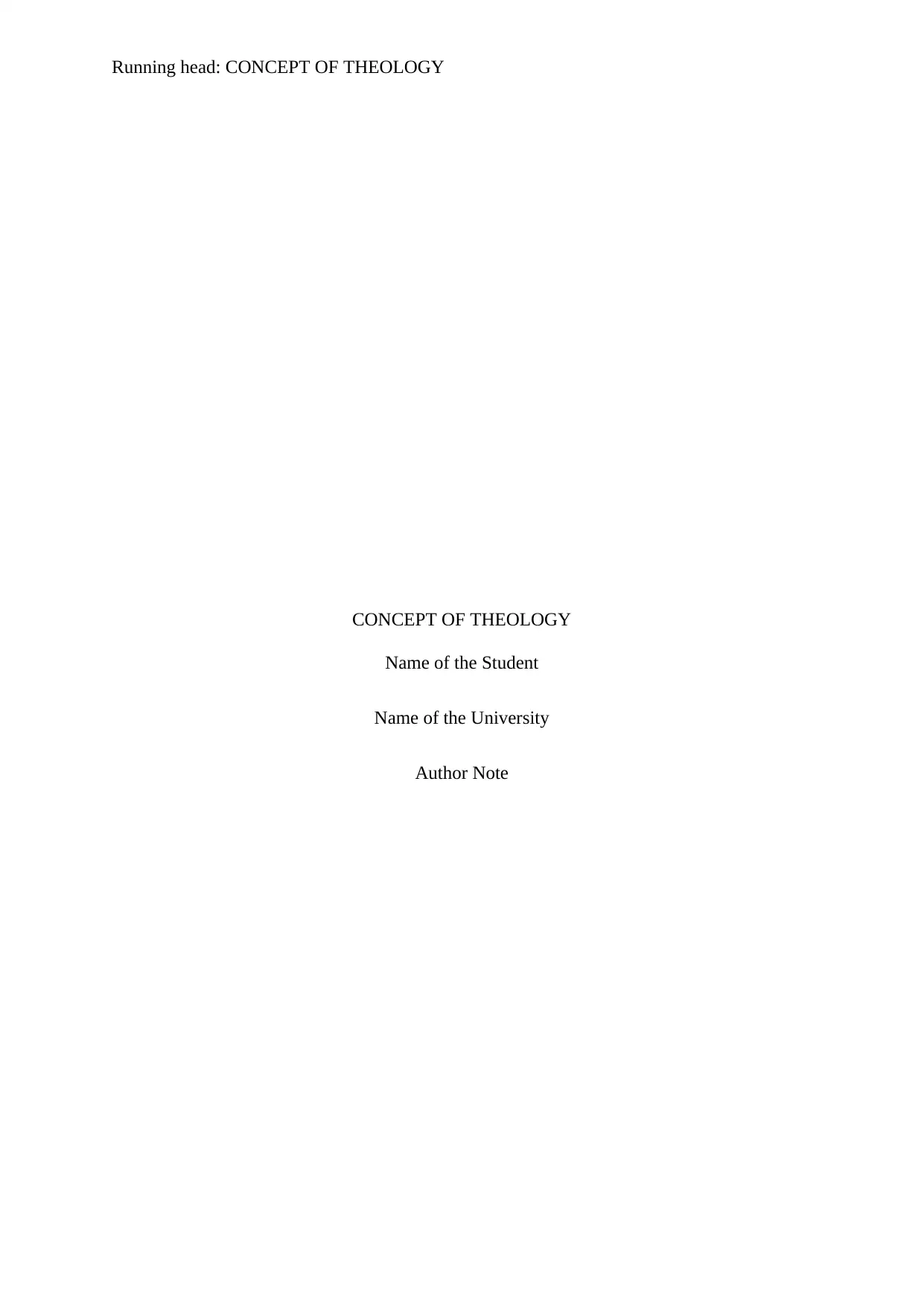
Running head: CONCEPT OF THEOLOGY
CONCEPT OF THEOLOGY
Name of the Student
Name of the University
Author Note
CONCEPT OF THEOLOGY
Name of the Student
Name of the University
Author Note
Paraphrase This Document
Need a fresh take? Get an instant paraphrase of this document with our AI Paraphraser
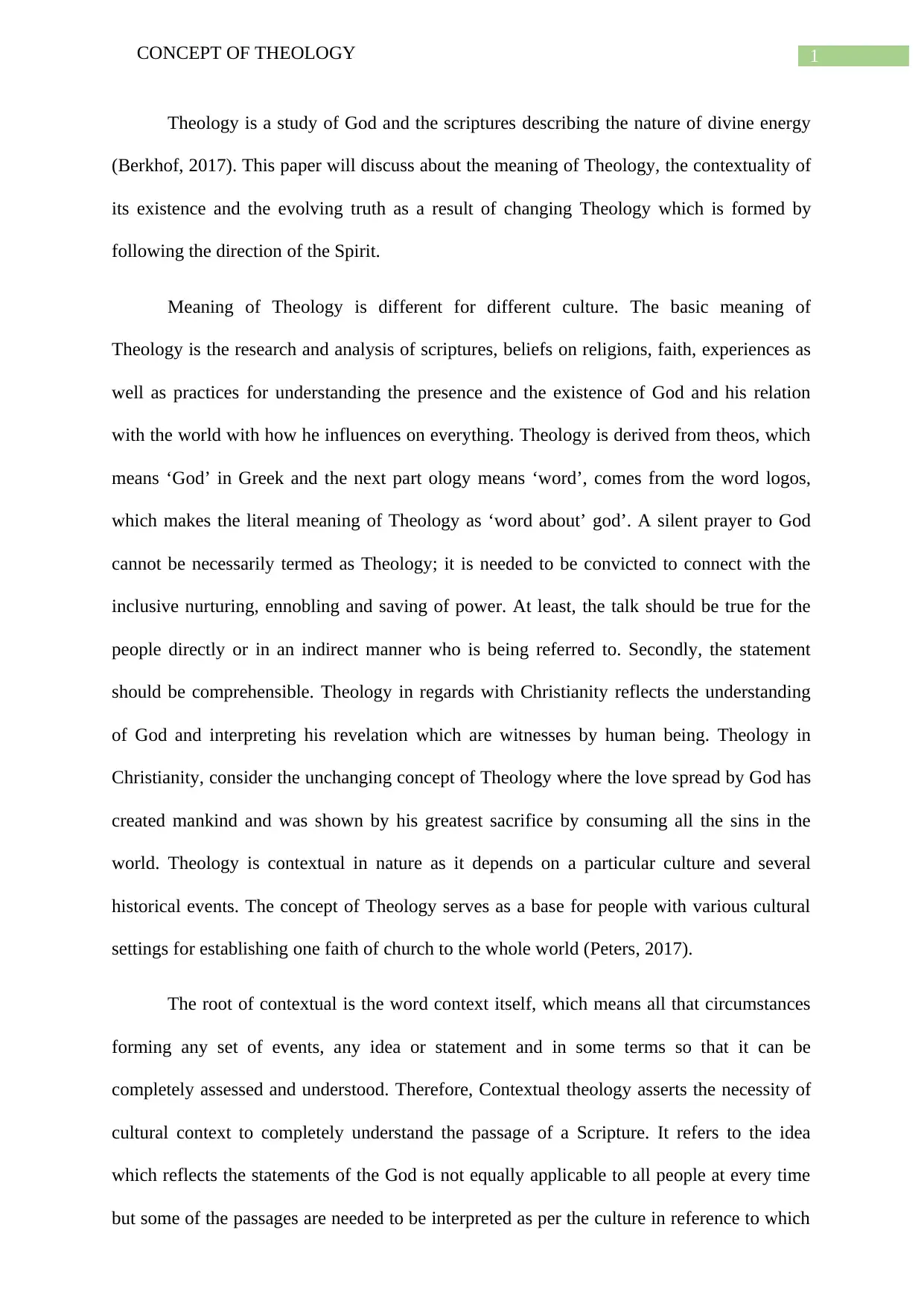
1CONCEPT OF THEOLOGY
Theology is a study of God and the scriptures describing the nature of divine energy
(Berkhof, 2017). This paper will discuss about the meaning of Theology, the contextuality of
its existence and the evolving truth as a result of changing Theology which is formed by
following the direction of the Spirit.
Meaning of Theology is different for different culture. The basic meaning of
Theology is the research and analysis of scriptures, beliefs on religions, faith, experiences as
well as practices for understanding the presence and the existence of God and his relation
with the world with how he influences on everything. Theology is derived from theos, which
means ‘God’ in Greek and the next part ology means ‘word’, comes from the word logos,
which makes the literal meaning of Theology as ‘word about’ god’. A silent prayer to God
cannot be necessarily termed as Theology; it is needed to be convicted to connect with the
inclusive nurturing, ennobling and saving of power. At least, the talk should be true for the
people directly or in an indirect manner who is being referred to. Secondly, the statement
should be comprehensible. Theology in regards with Christianity reflects the understanding
of God and interpreting his revelation which are witnesses by human being. Theology in
Christianity, consider the unchanging concept of Theology where the love spread by God has
created mankind and was shown by his greatest sacrifice by consuming all the sins in the
world. Theology is contextual in nature as it depends on a particular culture and several
historical events. The concept of Theology serves as a base for people with various cultural
settings for establishing one faith of church to the whole world (Peters, 2017).
The root of contextual is the word context itself, which means all that circumstances
forming any set of events, any idea or statement and in some terms so that it can be
completely assessed and understood. Therefore, Contextual theology asserts the necessity of
cultural context to completely understand the passage of a Scripture. It refers to the idea
which reflects the statements of the God is not equally applicable to all people at every time
but some of the passages are needed to be interpreted as per the culture in reference to which
Theology is a study of God and the scriptures describing the nature of divine energy
(Berkhof, 2017). This paper will discuss about the meaning of Theology, the contextuality of
its existence and the evolving truth as a result of changing Theology which is formed by
following the direction of the Spirit.
Meaning of Theology is different for different culture. The basic meaning of
Theology is the research and analysis of scriptures, beliefs on religions, faith, experiences as
well as practices for understanding the presence and the existence of God and his relation
with the world with how he influences on everything. Theology is derived from theos, which
means ‘God’ in Greek and the next part ology means ‘word’, comes from the word logos,
which makes the literal meaning of Theology as ‘word about’ god’. A silent prayer to God
cannot be necessarily termed as Theology; it is needed to be convicted to connect with the
inclusive nurturing, ennobling and saving of power. At least, the talk should be true for the
people directly or in an indirect manner who is being referred to. Secondly, the statement
should be comprehensible. Theology in regards with Christianity reflects the understanding
of God and interpreting his revelation which are witnesses by human being. Theology in
Christianity, consider the unchanging concept of Theology where the love spread by God has
created mankind and was shown by his greatest sacrifice by consuming all the sins in the
world. Theology is contextual in nature as it depends on a particular culture and several
historical events. The concept of Theology serves as a base for people with various cultural
settings for establishing one faith of church to the whole world (Peters, 2017).
The root of contextual is the word context itself, which means all that circumstances
forming any set of events, any idea or statement and in some terms so that it can be
completely assessed and understood. Therefore, Contextual theology asserts the necessity of
cultural context to completely understand the passage of a Scripture. It refers to the idea
which reflects the statements of the God is not equally applicable to all people at every time
but some of the passages are needed to be interpreted as per the culture in reference to which
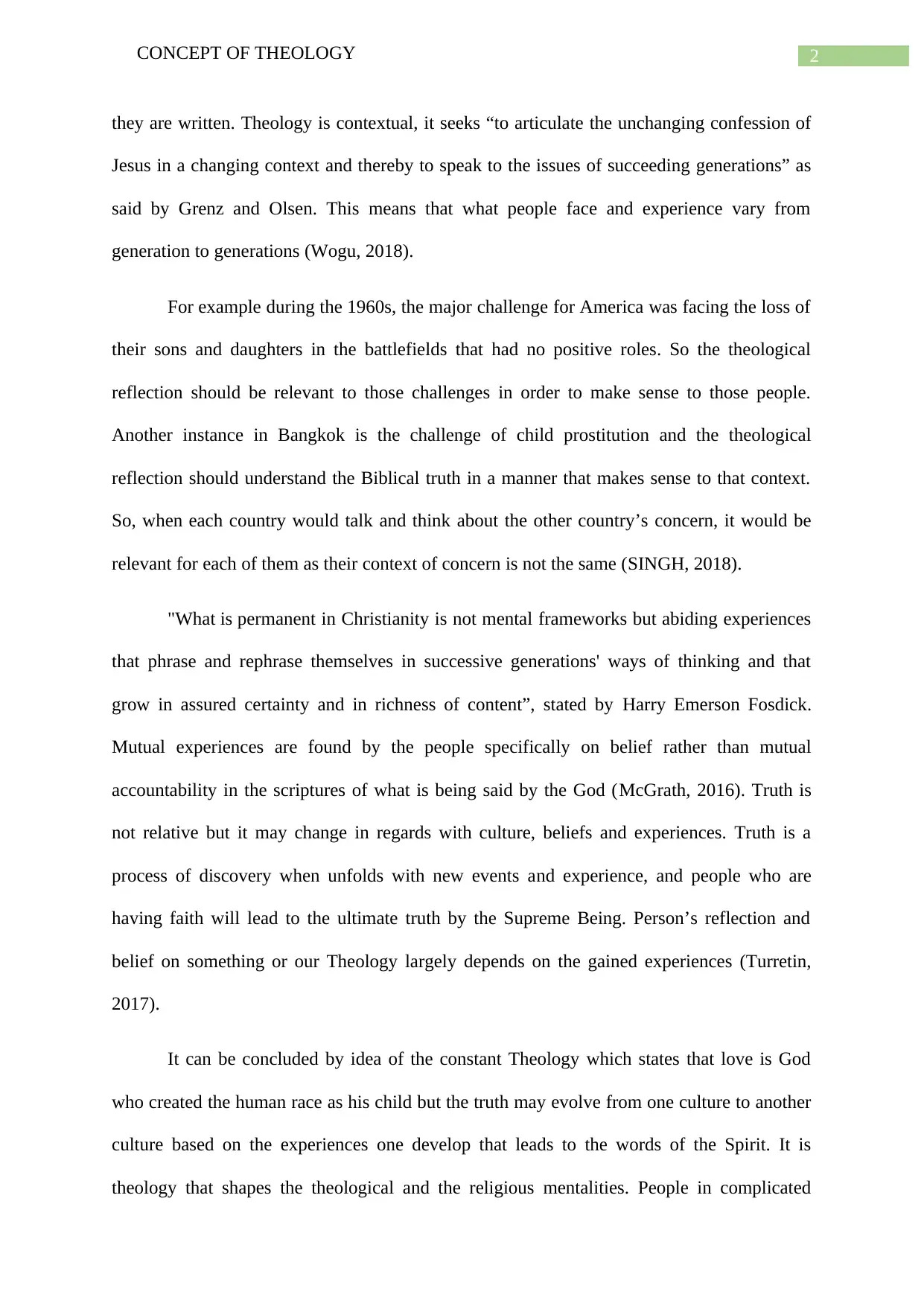
2CONCEPT OF THEOLOGY
they are written. Theology is contextual, it seeks “to articulate the unchanging confession of
Jesus in a changing context and thereby to speak to the issues of succeeding generations” as
said by Grenz and Olsen. This means that what people face and experience vary from
generation to generations (Wogu, 2018).
For example during the 1960s, the major challenge for America was facing the loss of
their sons and daughters in the battlefields that had no positive roles. So the theological
reflection should be relevant to those challenges in order to make sense to those people.
Another instance in Bangkok is the challenge of child prostitution and the theological
reflection should understand the Biblical truth in a manner that makes sense to that context.
So, when each country would talk and think about the other country’s concern, it would be
relevant for each of them as their context of concern is not the same (SINGH, 2018).
"What is permanent in Christianity is not mental frameworks but abiding experiences
that phrase and rephrase themselves in successive generations' ways of thinking and that
grow in assured certainty and in richness of content”, stated by Harry Emerson Fosdick.
Mutual experiences are found by the people specifically on belief rather than mutual
accountability in the scriptures of what is being said by the God (McGrath, 2016). Truth is
not relative but it may change in regards with culture, beliefs and experiences. Truth is a
process of discovery when unfolds with new events and experience, and people who are
having faith will lead to the ultimate truth by the Supreme Being. Person’s reflection and
belief on something or our Theology largely depends on the gained experiences (Turretin,
2017).
It can be concluded by idea of the constant Theology which states that love is God
who created the human race as his child but the truth may evolve from one culture to another
culture based on the experiences one develop that leads to the words of the Spirit. It is
theology that shapes the theological and the religious mentalities. People in complicated
they are written. Theology is contextual, it seeks “to articulate the unchanging confession of
Jesus in a changing context and thereby to speak to the issues of succeeding generations” as
said by Grenz and Olsen. This means that what people face and experience vary from
generation to generations (Wogu, 2018).
For example during the 1960s, the major challenge for America was facing the loss of
their sons and daughters in the battlefields that had no positive roles. So the theological
reflection should be relevant to those challenges in order to make sense to those people.
Another instance in Bangkok is the challenge of child prostitution and the theological
reflection should understand the Biblical truth in a manner that makes sense to that context.
So, when each country would talk and think about the other country’s concern, it would be
relevant for each of them as their context of concern is not the same (SINGH, 2018).
"What is permanent in Christianity is not mental frameworks but abiding experiences
that phrase and rephrase themselves in successive generations' ways of thinking and that
grow in assured certainty and in richness of content”, stated by Harry Emerson Fosdick.
Mutual experiences are found by the people specifically on belief rather than mutual
accountability in the scriptures of what is being said by the God (McGrath, 2016). Truth is
not relative but it may change in regards with culture, beliefs and experiences. Truth is a
process of discovery when unfolds with new events and experience, and people who are
having faith will lead to the ultimate truth by the Supreme Being. Person’s reflection and
belief on something or our Theology largely depends on the gained experiences (Turretin,
2017).
It can be concluded by idea of the constant Theology which states that love is God
who created the human race as his child but the truth may evolve from one culture to another
culture based on the experiences one develop that leads to the words of the Spirit. It is
theology that shapes the theological and the religious mentalities. People in complicated
⊘ This is a preview!⊘
Do you want full access?
Subscribe today to unlock all pages.

Trusted by 1+ million students worldwide
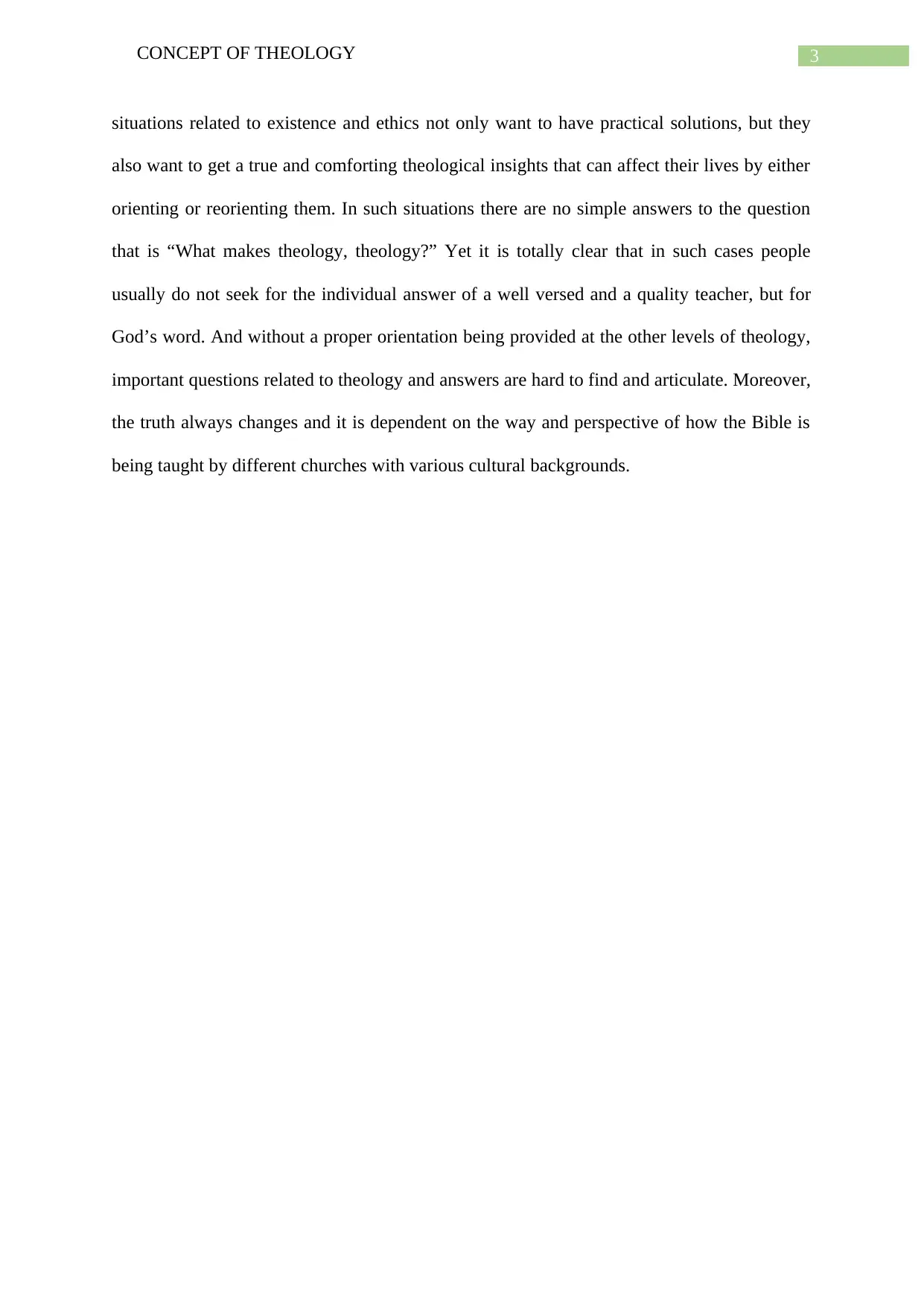
3CONCEPT OF THEOLOGY
situations related to existence and ethics not only want to have practical solutions, but they
also want to get a true and comforting theological insights that can affect their lives by either
orienting or reorienting them. In such situations there are no simple answers to the question
that is “What makes theology, theology?” Yet it is totally clear that in such cases people
usually do not seek for the individual answer of a well versed and a quality teacher, but for
God’s word. And without a proper orientation being provided at the other levels of theology,
important questions related to theology and answers are hard to find and articulate. Moreover,
the truth always changes and it is dependent on the way and perspective of how the Bible is
being taught by different churches with various cultural backgrounds.
situations related to existence and ethics not only want to have practical solutions, but they
also want to get a true and comforting theological insights that can affect their lives by either
orienting or reorienting them. In such situations there are no simple answers to the question
that is “What makes theology, theology?” Yet it is totally clear that in such cases people
usually do not seek for the individual answer of a well versed and a quality teacher, but for
God’s word. And without a proper orientation being provided at the other levels of theology,
important questions related to theology and answers are hard to find and articulate. Moreover,
the truth always changes and it is dependent on the way and perspective of how the Bible is
being taught by different churches with various cultural backgrounds.
Paraphrase This Document
Need a fresh take? Get an instant paraphrase of this document with our AI Paraphraser
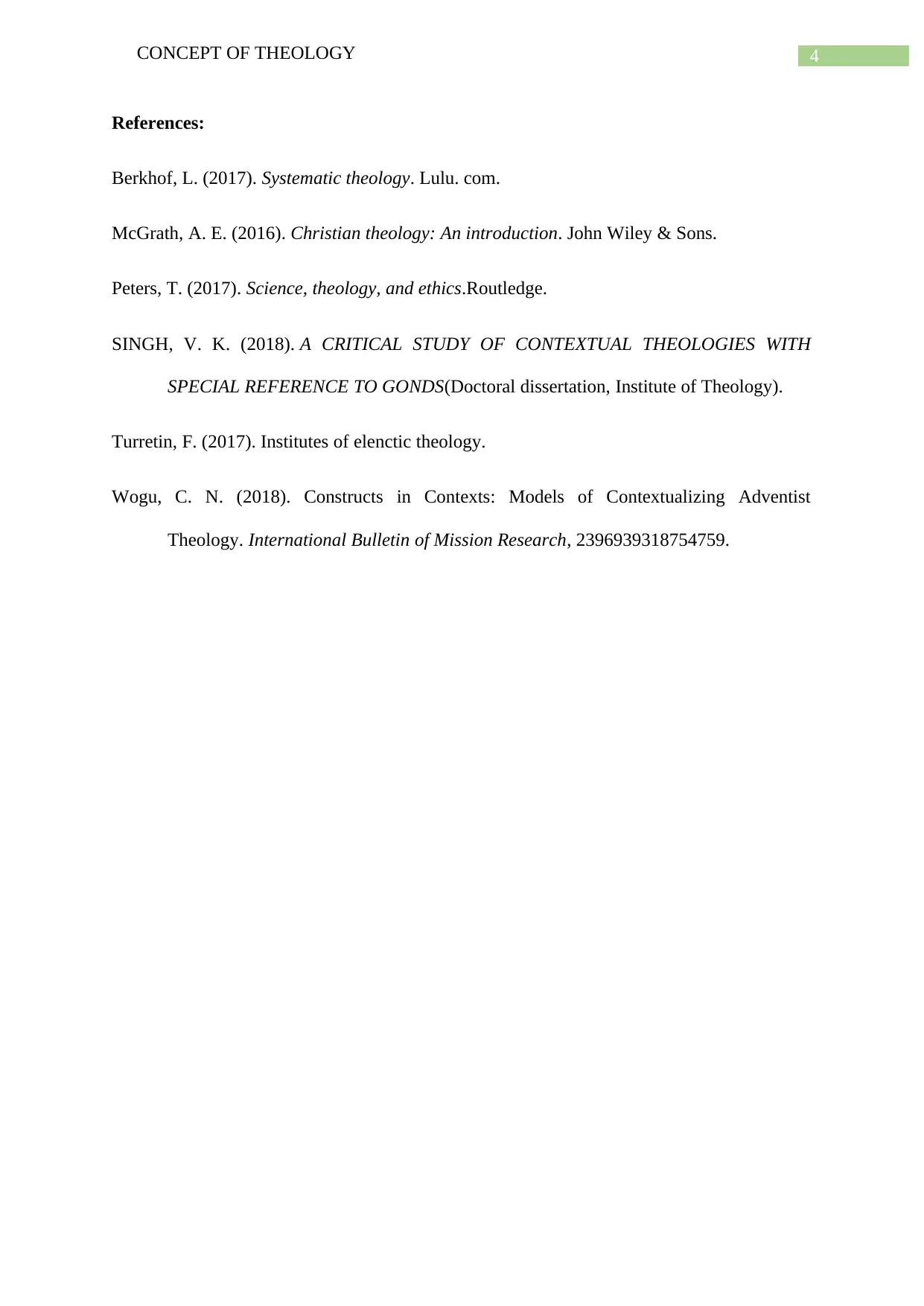
4CONCEPT OF THEOLOGY
References:
Berkhof, L. (2017). Systematic theology. Lulu. com.
McGrath, A. E. (2016). Christian theology: An introduction. John Wiley & Sons.
Peters, T. (2017). Science, theology, and ethics.Routledge.
SINGH, V. K. (2018). A CRITICAL STUDY OF CONTEXTUAL THEOLOGIES WITH
SPECIAL REFERENCE TO GONDS(Doctoral dissertation, Institute of Theology).
Turretin, F. (2017). Institutes of elenctic theology.
Wogu, C. N. (2018). Constructs in Contexts: Models of Contextualizing Adventist
Theology. International Bulletin of Mission Research, 2396939318754759.
References:
Berkhof, L. (2017). Systematic theology. Lulu. com.
McGrath, A. E. (2016). Christian theology: An introduction. John Wiley & Sons.
Peters, T. (2017). Science, theology, and ethics.Routledge.
SINGH, V. K. (2018). A CRITICAL STUDY OF CONTEXTUAL THEOLOGIES WITH
SPECIAL REFERENCE TO GONDS(Doctoral dissertation, Institute of Theology).
Turretin, F. (2017). Institutes of elenctic theology.
Wogu, C. N. (2018). Constructs in Contexts: Models of Contextualizing Adventist
Theology. International Bulletin of Mission Research, 2396939318754759.
1 out of 5
Related Documents
Your All-in-One AI-Powered Toolkit for Academic Success.
+13062052269
info@desklib.com
Available 24*7 on WhatsApp / Email
![[object Object]](/_next/static/media/star-bottom.7253800d.svg)
Unlock your academic potential
Copyright © 2020–2025 A2Z Services. All Rights Reserved. Developed and managed by ZUCOL.





